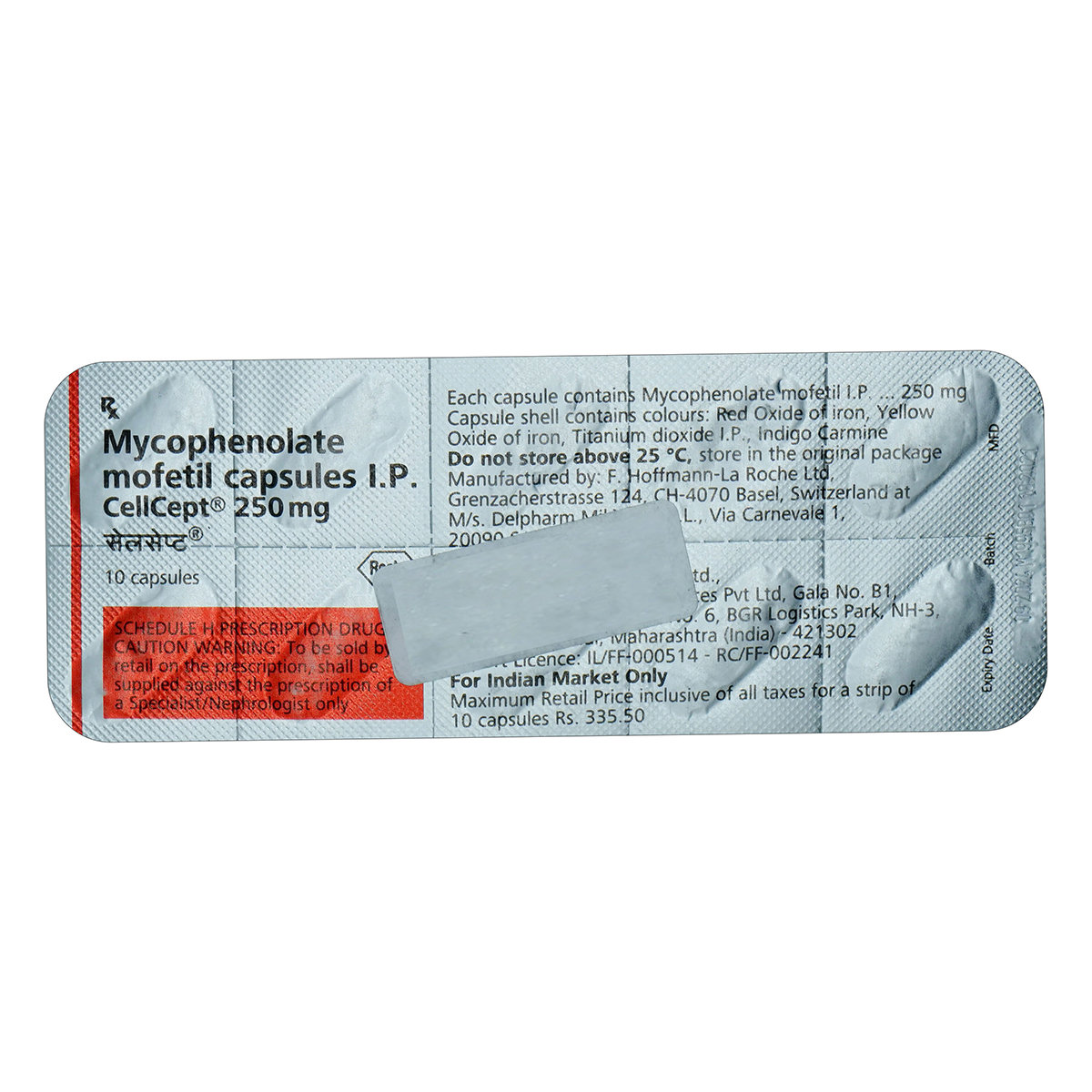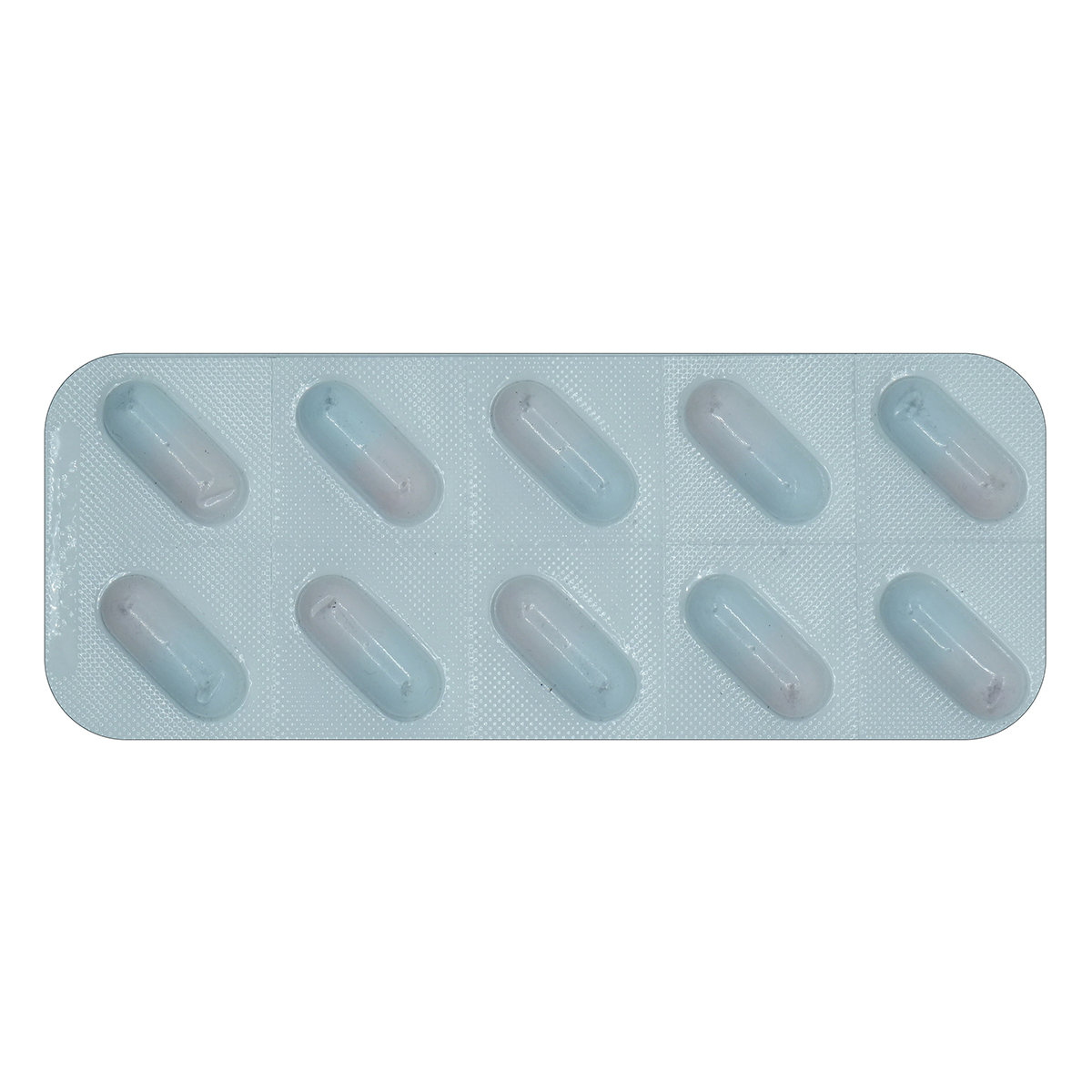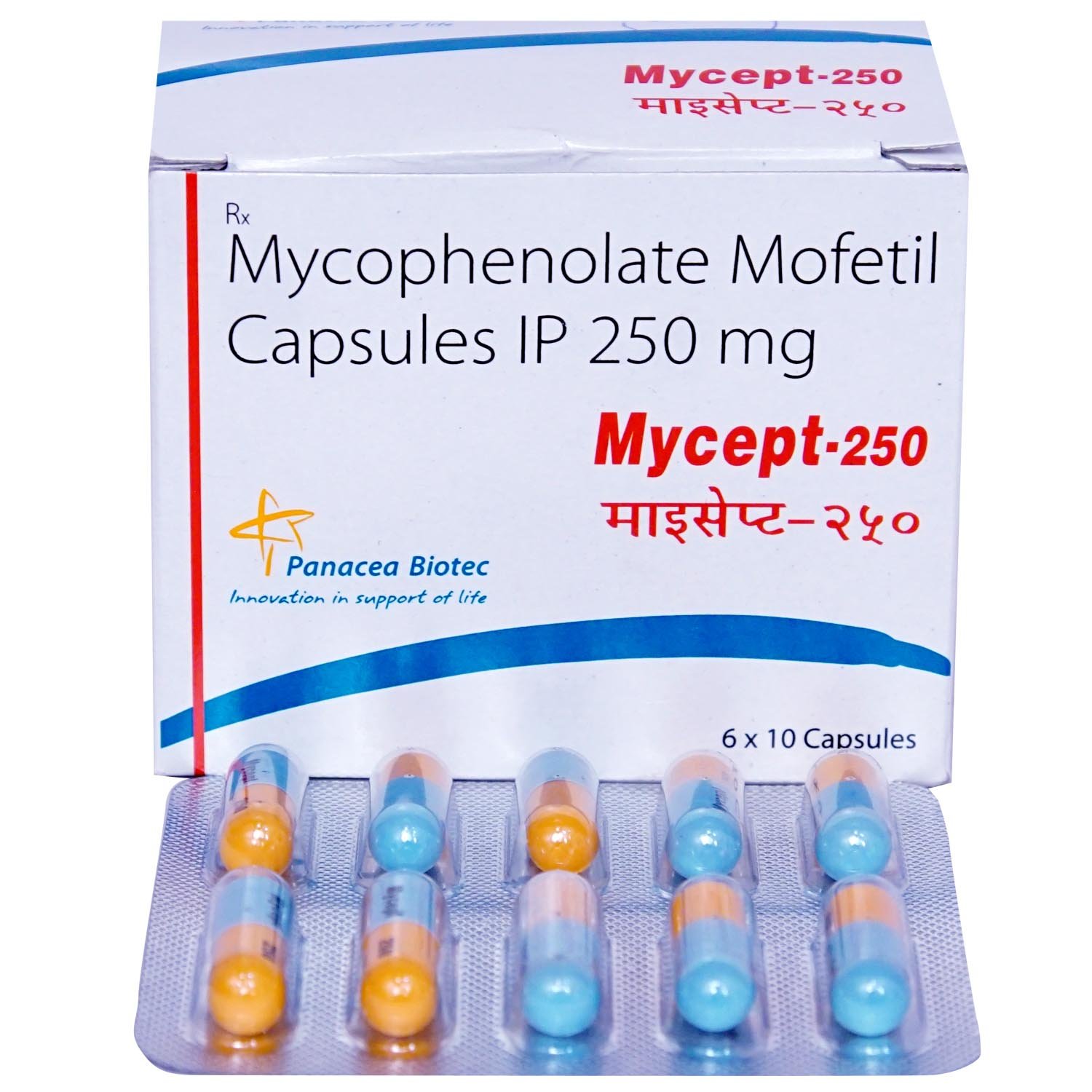Cellcept 250mg Capsule


MRP ₹415.5
(Inclusive of all Taxes)
₹49.9 Cashback (12%)
know your delivery time
Provide Delivery Location
Composition :
Consume Type :
Expires on or after :
Return Policy :
NPPA :

Secure Payment

Trusted by 8 Crore Indians

Genuine Products
Therapeutic Class
Country of origin
Manufacturer/Marketer address
Disclaimer
Alcohol
Safe if prescribed
Consumption of alcohol may worsen the condition by increasing the risk of side-effects.
Pregnancy
Consult your doctor
Cellcept 250mg Capsule is a pregnancy category D drug. It causes birth defects in the fetus. So, it is not recommended for use in pregnant women.
Breast Feeding
Consult your doctor
Cellcept 250mg Capsule is not recommended for breastfeeding mothers as it may be excreted in the breast milk. However, your doctor may prescribe Cellcept 250mg Capsule if the benefits outweigh the risks.
Driving
Safe if prescribed
Cellcept 250mg Capsule may not affect your ability to drive. However, ask your doctor's advice, whether it is safe to drive based on your health conditions.
Liver
Consult your doctor
Cellcept 250mg Capsule should be used with caution in patients with liver diseases. Dose adjustments may be necessary.
Kidney
Consult your doctor
Cellcept 250mg Capsule should be used with caution in patients with kidney diseases. Dose adjustments may be necessary.
Children
Safe if prescribed
Cellcept 250mg Capsule should be used with caution in children below 12 years of age. Dose adjustments may be necessary.
Product Substitutes
About Cellcept 250mg Capsule
Cellcept 250mg Capsule belongs to a class of medications called ‘immunosuppressants’ used to prevent the body from rejecting a transplanted organ such as a kidney, heart or liver. Transplant rejection occurs when the recipient’s immune system identifies the transplanted organ as a ‘foreign object’ and attacks it. If it is not treated promptly, it may cause irreversible damage.
Cellcept 250mg Capsule contains ‘Mycophenolate mofetil’ used in the treatment of organ transplant rejection along with another immunosuppressant and anti-inflammatory agent. It inhibits T and B lymphocytes (a type of white blood cell that attacks foreign cells) and suppresses the production of antibodies (identify and kill foreign cells). These effects suppress the immune system so that the transplanted graft is not rejected.
Take Cellcept 250mg Capsule as prescribed. Your doctor will advise you on how often you take Cellcept 250mg Capsule based on your medical condition. The common side effects of Cellcept 250mg Capsule are diarrhoea, vomiting, decreased white blood cells and red blood cell count and infections. Consult your doctor right away if any of these side effects persist or worsen.
Do not take Cellcept 250mg Capsule if you are allergic to ‘mycophenolate mofetil’ or any ingredients present in it. Also, do not take it if you are pregnant, planning to become pregnant, or not using effective contraception and breastfeeding. It can cause birth defects/congenital disabilities in the unborn baby, so make sure you take a pregnancy test before using Cellcept 250mg Capsule if you are a woman of childbearing potential. You are advised to use effective contraception while taking Cellcept 250mg Capsule . It can increase the risk of skin cancer, so wear protective clothing and limit exposure to sunlight. It increases the risk of infections as it can suppress the immune system. Do not donate blood or sperm without informing your doctor. Please do not take any vaccinations as it may be less effective.
Uses of Cellcept 250mg Capsule
Medicinal Benefits Mweb
Key Benefits
Cellcept 250mg Capsule contains ‘Mycophenolate mofetil’ which belongs to the class of ‘immunosuppressants’. It is used to prevent organ transplant rejection. It reduces the activity of the immune system by inhibiting the action of white blood cells (responsible for immune reactions) in the body. It is preferred to use over steroids, which have long-term side effects.
Directions for Use
Side Effects of Cellcept 250mg Capsule
- Diarrhoea
- Vomiting
- Infections
- Low white blood cell (WBC) count
- Red blood cell (RBC) count
Drug Warnings
Before taking Cellcept 250mg Capsule , inform your doctor if you have a sign of infection such as a fever or sore throat, have any unexpected bruising or bleeding, have a history of digestive system problems such as a stomach ulcer, are planning to become pregnant, get pregnant while taking Cellcept 250mg Capsule , and have rare hereditary disorders such as Lesch-Nyhan or Kelley-Seegmiller syndrome (conditions caused by a deficiency of the enzyme hypoxanthine-guanine phosphoribosyl-transferase (HGPRT)). Limit your exposure to sunlight as Cellcept 250mg Capsule increases the risk of skin cancer. Do not donate blood while taking Cellcept 250mg Capsule and for at least 60 days after discontinuing the therapy. Men should not donate sperm while taking Cellcept 250mg Capsule for at least 90 days after discontinuing the therapy. Please do not take any vaccinations (live vaccine) as it will not be much effective. The oral suspension contains aspartame (sweetener and a phenylalanine source), so it should be used with caution in patients with phenylketonuria (a birth defect/congenital disability that causes decreased metabolism of phenylalanine).
Drug-Drug Interactions
Drug-Drug Interactions
Login/Sign Up
Coadministration of Colestipol with Cellcept 250mg Capsule can reduce its absorption and action in the body. This can lead to low treatment results.
How to manage the interaction:
Taking Cellcept 250mg Capsule with Colestipol is not recommended as it can result in an interaction, it can be taken if your doctor has advised it.
Coadministration of Cellcept 250mg Capsule and Tofacitinib can increase the risk or severity of developing serious infections
How to manage the interaction:
Taking Cellcept 250mg Capsule and Tofacitinib together can possibly result in an interaction, it can be taken if your doctor has advised it. However, if you experience fever, chills, diarrhoea, sore throat, muscle aches, shortness of breath, blood in phlegm, weight loss, red or inflamed skin, body sores, and pain or burning during urination consult a doctor. Do not discontinue any medications without a doctor's advice.
Coadministration of Cellcept 250mg Capsule and Desogestrel can decrease the levels and action of Desogestrel.
How to manage the interaction:
Co-administration of Desogestrel with Cellcept 250mg Capsule can possibly result in an interaction, but it can be taken if your doctor has advised it. If you notice any of these symptoms: abnormal menstruation, dryness of the vagina, or increased hot flushes or if you're looking for other birth control options, consult a doctor. Do not discontinue any medications without consulting a doctor.
Coadministration of Ethinylestradiol with Cellcept 250mg Capsule may lower the blood levels and effects of Ethinylestradiol, making it less effective as a form of birth control.
How to manage the interaction:
There could be a possible interaction between Cellcept 250mg Capsule and Ethinylestradiol, but they can be taken together if a doctor has prescribed them. However, if you are taking hormone replacement therapy for menopause, and you notice an increase in the frequency or severity of your symptoms, such as hot flashes, vaginal dryness, or irregular bleeding, consult a doctor. Do not discontinue any medications without a doctor's advice.
Coadministration of Norethisterone and Cellcept 250mg Capsule can decrease the levels and effects of Norethisterone.
How to manage the interaction:
There could be a possible interaction between Cellcept 250mg Capsule and Norethisterone, but they can be taken together if your doctor has prescribed them. However, if you experience hot flashes, vaginal dryness, or abnormal bleeding consult a doctor. Do not discontinue any medications without a doctor's advice.
A combined use of Levonorgestrel with Cellcept 250mg Capsule may reduce the blood levels and effects of levonorgestrel, which may make it less reliable as a form of birth control, Cellcept 250mg Capsule may cause pregnancy loss in the first trimester and also birth defects in the unborn child.
How to manage the interaction:
There could be a possible interaction between Cellcept 250mg Capsule and Levonorgestrel, but they can be taken together if a doctor has prescribed them. However, if you take hormone replacement (Levonorgestrel) for menopause, and if you experience hot flashes, vaginal dryness, or abnormal bleeding consult a doctor. Do not discontinue any medications without a doctor's advice.
Coadministration of Cellcept 250mg Capsule and Colestyramine can decrease the effect of Cellcept 250mg Capsule.
How to manage the interaction:
There could be a possible interaction between Cellcept 250mg Capsule and Cholestyramine, it can be taken together if your doctor has prescribed them. However, if you experience fever, diarrhea, sore throat, muscle aches, shortness of breath, inflamed skin, body pain, or burning during urination consult a doctor. Do not discontinue any medications without a doctor's advice.
Taking Cellcept 250mg Capsule and Golimumab can lead to or increase the risk or severity of developing serious infections.
How to manage the interaction:
There could be a possible interaction between Cellcept 250mg Capsule and Golimumab, but they can be taken together if your doctor has prescribed them. However, if you experience fever, chills, diarrhoea, sore throat, muscle aches, shortness of breath, blood in phlegm, weight loss, red or inflamed skin, body sores, and pain or burning during urination consult a doctor. Do not discontinue any medications without a doctor's advice.
Coadministration of medroxyprogesterone with Cellcept 250mg Capsule may decrease the levels and effects of medroxyprogesterone.
How to manage the interaction:
There could be a possible interaction between Cellcept 250mg Capsule and Medroxyprogesterone, but they can be taken together if your doctor has prescribed them. However, if you experience hot flashes, vaginal dryness, or abnormal bleeding consult a doctor. Do not discontinue any medications without a doctor's advice.
Co-administration of Ferrous sulfate with Cellcept 250mg Capsule decreases levels of Mycophenolate by reducing its absorption.
How to manage the interaction:
There could be a possible interaction between Cellcept 250mg Capsule and Ferrous sulfate, but they can be taken together if a doctor has prescribed them. However, if you experience upset stomach, nausea, vomiting, diarrhea, constipation sleep problems, fatigue, headache, painful urination, high blood pressure, or swelling of the lower legs, ankles, or feet, joint pain, cough, or shortness of breath consult a doctor. Do not discontinue any medications without a doctor's advice.
Drug-Food Interactions
Drug-Food Interactions
Login/Sign Up
Drug-Diseases Interactions
Drug-Diseases Interactions
Login/Sign Up
Drug-Drug Interactions Checker List
- AZATHIOPRINE
- ACICLOVIR
- GANCICLOVIR
- RIFAMPICIN
- NORFLOXACIN+METRONIDAZOLE
Habit Forming
Special Advise
- Your doctor may advise you to take regular blood tests to monitor blood cell counts and liver function. In general, the tests are done every 2 to 4 weeks in the initial two months, followed by once every 2 to 3 months.
- Do not have immunizations/vaccinations without the consent of your doctor. Avoid contact with people who have recently received live vaccines (such as flu vaccine inhaled through the nose).
Diet & Lifestyle Advise
- Eat a well-balanced and healthy diet as it helps you to recover quickly. A dietitian will help you to create a diet plan based on your health condition.
- Avoid eating raw or undercooked food.
- Protect yourself from exposure to sunlight and soil. Wear a long-sleeve shirt, hat, long pants and shoes while going outdoors. Also, wear sunscreen with high SPF.
- Stay away from people who are sick.
- Limit alcohol consumption and quit smoking.
- Talk with your doctor at least 2 months before leaving, if you plan to travel, especially to developing countries.
All Substitutes & Brand Comparisons
RX
Mycept 250 Capsule 10's
Panacea Biotec Ltd
₹338
(₹29.74 per unit)
18% CHEAPERRX
Renodapt-250 Capsule 10's
Biocon Ltd
₹520
(₹46.8 per unit)
28% COSTLIER

Have a query?
Buy best Immuno Modulators products by
Intas Pharmaceuticals Ltd
Ipca Laboratories Ltd
Panacea Biotec Ltd
Cipla Ltd
Emcure Pharmaceuticals Ltd
Biocon Ltd
Hetero Healthcare Pvt Ltd
RPG Life Sciences Ltd
Reliance Formulation Pvt Ltd
Sun Pharmaceutical Industries Ltd
Bharat Serums and Vaccines Ltd
Novartis India Ltd
Zydus Healthcare Ltd
Overseas Health Care Pvt Ltd
Prevego Healthcare & Research Pvt Ltd
Wallace Pharmaceuticals Pvt Ltd
Zydus Cadila
Alkem Laboratories Ltd
Alembic Pharmaceuticals Ltd
Cadila Healthcare Ltd
Knoll Healthcare Pvt Ltd
La Renon Healthcare Pvt Ltd
Msn Laboratories Pvt Ltd
Abbott India Ltd
Concord Biotech Ltd
EVERVITAL LIFESCIENCES
Mylan Pharmaceuticals Pvt Ltd
Steadfast MediShield Pvt Ltd
Tas Med India Pvt Ltd
Wockhardt Ltd
Anthem Bio Pharma
Hetero Drugs Ltd
Hospimax Healthcare Pvt Ltd
Indiabulls Pharmaceuticals Pvt Ltd
Micro Labs Ltd
Biotest Pharma Gmbh
Brinton Pharmaceuticals Ltd
CONCORD DRUGS LTD
Calren Care Lifesciences Pvt Ltd
Celon Laboratories Pvt Ltd
Cognitus Life Sciences Pvt Ltd
Medgenix Pharma India Pvt Ltd
Mediart Life Sciences Pvt Ltd
Natco Pharma Ltd
Rene Lifescience
Vasu Organics Pvt Ltd
Alniche Life Sciences Pvt Ltd
Ankaa Pharmaceutical
Arcalis India Pharmaceuticals Pvt Ltd
Astellas Pharma India Pvt Ltd
Bharat Sanchar Nigam Ltd
Canixa Life Sciences Pvt Ltd
Care Formulations Lab
Celera Healthcare Pvt Ltd
Concord Laboratories Pvt Ltd
Dr Reddy's Laboratories Ltd
Immune Biotech Pvt Ltd
Lupin Ltd
Oxygen Pharma Care Pvt Ltd
Plasmagen Biosciences Pvt Ltd
Rhumasafe Pharma
Rivan Pharmaceuticals Pvt Ltd
Rockmed Pharma Pvt Ltd
The Madras Pharmaceuticals
Ajanta Pharma Ltd
Akognos Life Science Pvt Ltd
Aubade Healthcare Pvt Ltd
Biogen Idec Biotech India Pvt Ltd
Cadila Pharmaceuticals Ltd
Celera Pharma Pvt Ltd
East West Pharma India Pvt Ltd
Elera Pharma Ltd
Eli Lilly and Company (India) Pvt Ltd
Enactis Healthcare Pvt Ltd
Entero Healthcare Solution Pvt Ltd
Fresenius Kabi India Pvt Ltd
Galcare Pharmaceuticals Pvt Ltd
Getwell Oncology Pvt Ltd
Glasier Wellness Inc
GlaxoSmithKline Pharmaceuticals Ltd
Glenmark Pharmaceuticals Ltd
J B Chemicals & Pharmaceuticals Ltd
Neuten HealthCare
Pfizer Ltd
Renauxe Pharma India Pvt Ltd
Sai Mirra Innopharma Pvt Ltd
Steris Healthcare
Torrent Pharmaceuticals Ltd
United Biotech Pvt Ltd
Virchow Biotech Pvt Ltd
Actus Health Care
Alacris Healthcare Pvt Ltd
Ant Pharmaceuticals Pvt Ltd
Assentus Biogenics Pvt Ltd
Aureate Healthcare
Azista Industries Pvt Ltd
BDH Industries Ltd
BSA Pharma Inc
Bharat Biotech
Bioceutics Inc
Recommended for a 30-day course: 6 Strips



